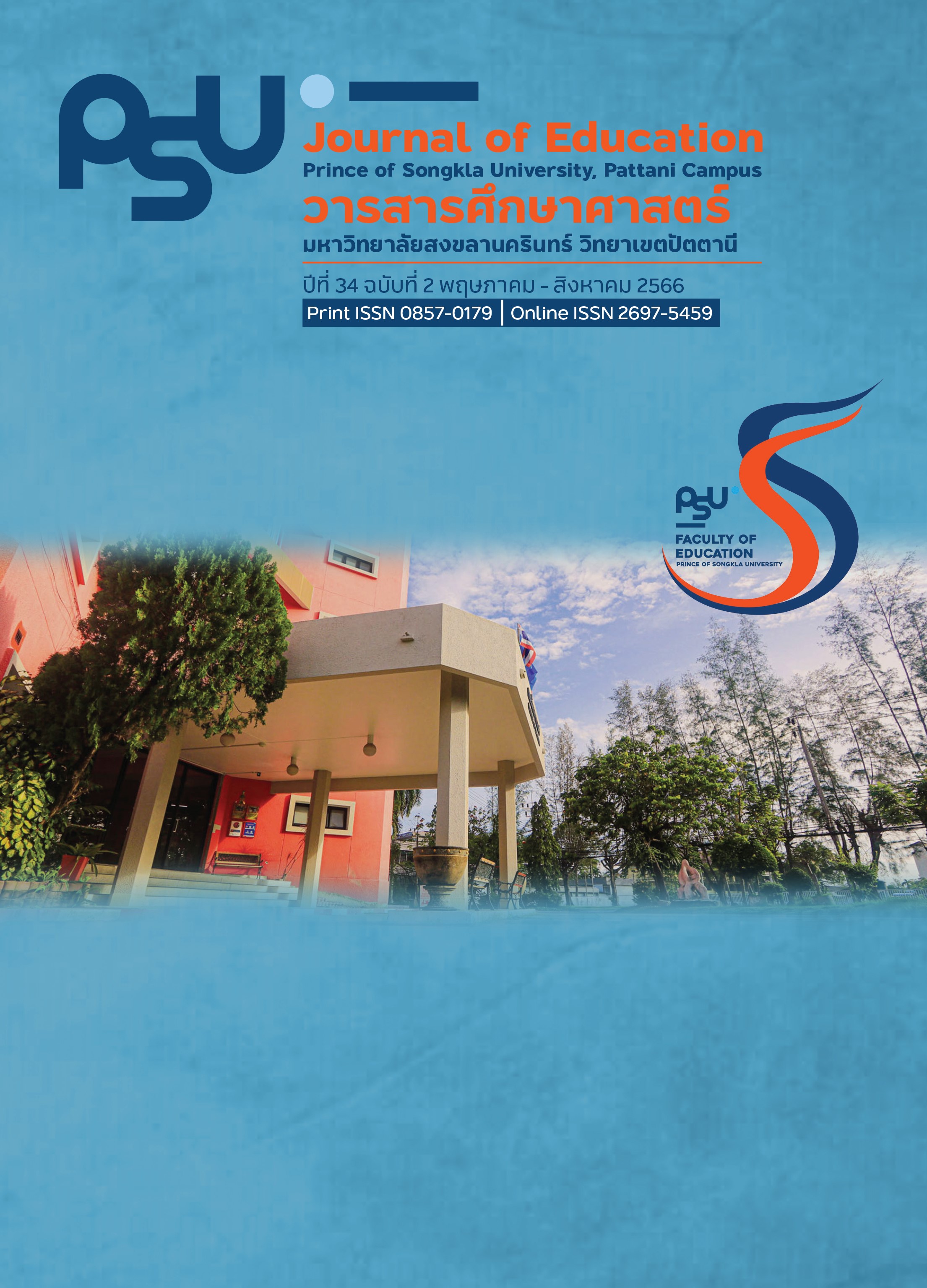ผลของการจัดการเรียนการสอนวิทยาศาสตร์ด้วยรูปแบบการสืบสอบแบบโต้แย้งที่มีต่อผลสัมฤทธิ์ทางการเรียนวิทยาศาสตร์ และความคงทนในการเรียนรู้ของนักเรียนระดับชั้นมัธยมศึกษาปีที่ 3
Main Article Content
บทคัดย่อ
การวิจัยครั้งนี้เป็นการวิจัยกึ่งทดลอง มีวัตถุประสงค์เพื่อ 1) เปรียบเทียบผลสัมฤทธิ์ทางการเรียนวิทยาศาสตร์ของนักเรียนระดับชั้นมัธยมศึกษาปีที่ 3 ระหว่างก่อนและหลังได้รับการจัดการเรียนการสอนวิทยาศาสตร์ด้วยรูปแบบการสืบสอบแบบโต้แย้ง 2) ศึกษาความคงทนในการเรียนรู้ของนักเรียนระดับชั้นมัธยมศึกษาปีที่ 3 หลังได้รับการจัดการเรียนการสอนวิทยาศาสตร์ด้วยรูปแบบการสืบสอบแบบโต้แย้ง กลุ่มตัวอย่างที่ใช้คือ นักเรียนระดับชั้นมัธยมศึกษาปีที่ 3 ของโรงเรียนสาธิตมหาวิทยาลัยรามคำแหง ที่กำลังศึกษาในภาคเรียนที่ 1 ปีการศึกษา 2560 จำนวน 40 คน เครื่องมือที่ใช้ในการวิจัยครั้งนี้ คือ 1) แบบทดสอบวัดผลสัมฤทธิ์ทางการเรียนวิชาวิทยาศาสตร์แบบเลือกตอบจำนวน 30 ข้อ มีค่าความยากง่าย 0.53-0.65 ค่าอำนาจจำแนก 0.44-0.88 และค่าความเชื่อมั่น 0.89 2) แผนการจัดการเรียนรู้วิทยาศาสตร์ จำนวน 6 แผน ที่ใช้รูปแบบการสืบสอบแบบโต้แย้ง วิเคราะห์ข้อมูลด้วยสถิติค่าเฉลี่ย ค่าเฉลี่ยร้อยละ ส่วนเบี่ยงเบนมาตรฐาน สถิติทดสอบที (Dependent t-test) ผลการวิจัยสรุปได้ดังนี้ 1) นักเรียนที่เรียนวิทยาศาสตร์ด้วยรูปแบบการสืบสอบแบบโต้แย้งมีคะแนนเฉลี่ยผลสัมฤทธิ์ทางการเรียนวิทยาศาสตร์หลังทดลองสูงกว่าก่อนทดลอง อย่างมีนัยสำคัญทางสถิติที่ระดับ .05 2) นักเรียนที่เรียนวิทยาศาสตร์ด้วยรูปแบบการสืบสอบแบบโต้แย้ง จะมีคะแนนเฉลี่ยผลสัมฤทธิ์ทางการเรียนวิทยาศาสตร์หลังการทดลองทันที และหลังการทดลอง 2 สัปดาห์ ไม่แตกต่างกัน แสดงว่านักเรียนที่เรียนวิทยาศาสตร์ด้วยรูปแบบการสืบสอบแบบโต้แย้งมีความคงทนในการเรียนรู้
Article Details

อนุญาตภายใต้เงื่อนไข Creative Commons Attribution-NonCommercial 4.0 International License.
เอกสารอ้างอิง
Atkinson, R.C. et al. (1990). Introduction to psychology. New York: Harcourt Brace Jovanorich.
Bloom, B.S. (1956). Taxonomy of education objective hand book 1: The cognitive domain New York: McKay.
Bloom, B.S. (1956).Taxonomy of education objective hand book 1: The cognitive domai n. New York: McKay.
Chesa, P. (2017). Effect of Argument-Driven Inquiry Instruction Model on Biology Achievement, Analytical Thinking and Instructional Satisfaction of Grade 10 Students. [Master’s thesis, Prince of Songkla University]. PSU Knowledge Bank. [in Thai]
Cross, D., Taasoobshirazi, G. Hendricks, S., and Hickey,D.T. (2008). Argumentation: A Strategy for improving achievement and revealing scientific identities. International Journal of Science Education, 30(6), 837-861.
Institute for the Promotion of Teaching Science and Technology. (2013). Results of PISA 2012 Assessment, Reading, Mathematics and science Executive Summary. Bangkok: Institute for the Promotion of Teaching Science and Technology. [in Thai]
Jacobson, W. J., & Bergman, A. B. (1999). Science for children and book for teachers. (3rd ed.). Englewood Cliffs, NJ: Prentice Hall.
Ministry of Education. (2008). Basic Education Core Curriculum 2008. Bangkok: Agricultural Cooperative Community Printing House of Thailand. [in Thai]
Nunnally, J.C. (1959). Test and Measurement. New York:McGraw-Hill.
Office of the National Education Commission. (2002). National Education Plan (2002-2016) Summary. Bangkok: Office of the National Education Commission. [in Thai]
Office of Academic Affairs and Educational Standards. (2009). Guidelines for measuring and evaluating learning outcomes according to the curriculum The Core of Basic Education, B.E. 2551 (2008). (2nd ed.). Bangkok. Printing House, Cooperative Society Agriculture of Thailand Co., Ltd. [in Thai]
Okumus, S., & Unal, S. (2012). The Effects of argumentation model on students’ achievement and argument skills in science. Procedia-Social and Behavioral Science, 46, 457-461.
Paratkul, C. (1993). Measurement techniques. Bangkok: Watthana Panich. [in Thai]
Ruangsuwan, C. (1990). Educational Technology: Theory and Research. Bangkok: Odeon Store. [in Thai]
Sampson, V. (2009). Argument-driven inquiry: Way to promote learning during laboratory activities. The Science Teacher, 9, 42-47.
Sampson, V., & Clark, D. V. (2009). The impact of collaboration on the outcomes of scientific argumentation. Science Education, 93, 448-484.
Sampson, V., Walker, J.P., Anderson, B., and Zimmerman, C. O. (2011). Argument-Driven Inquiry as a Way to Help Students Learn How to Participate in Scientific Argumentation and Craft Written Arguments: An Exploratory Study. Science Education, 95(2), 217-257.
Supasorn, S., & Lordkam (2014). A. Enhancement of Grade 7 student’ learning achievement of the matter separation by using inquiry learning activities. Social and Behavior Sciences, 116, 739-743. [in Thai]
Walker, J. P. (2010). Argument-driven inquiry: An instructional model for use in undergraduate chemistry labs. Philadelphia: National Association of Research in Science Teaching.
Wallace, C.S., Hand, B. & Prain, V. (2004). Writing and Learning in the Science Classroom. Boston, MA: Kluwer Academic.


